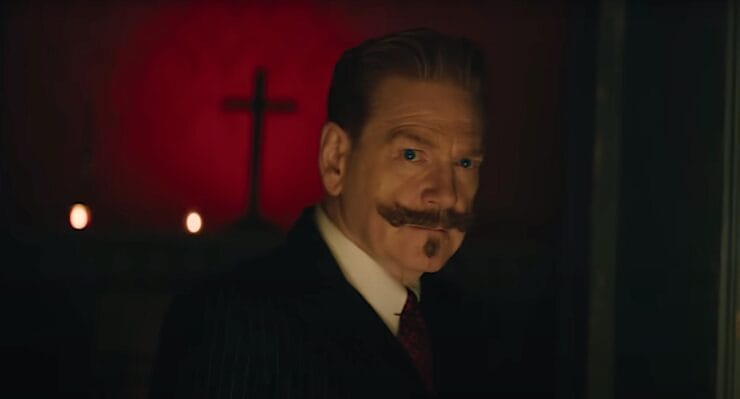Let me start by throwing my cards on the table. I didn’t like Kenneth Branagh’s adaptation of Murder on the Orient Express when I watched it the first time. But then, a few months later, it happened to be on TV and I found myself watching it. And enjoying it. The same thing happened again a few months later. And when I found out he was making a second Poirot movie I was startled to feel a thrill of anticipation for it, and even had a vague plan to go see it in the theater this time. As Death on the Nile began its ad campaign, I was fascinated/horrified by each new wrench thrown at the film, from the most cursed cast in history to CGI weirdness to, finally, COVID delays. When I finally watched the movie, at home for safety reasons, I was so bowled over by the decision to give Poirot’s mustache its own gritty origin story (!!!!!) that the rest of the film had my heart no matter what it did—and then what it did was make Gal Gadot say they had “enough champagne to fill the Nile.”
I’ve watched it twice since it came out and enjoyed the hell out of it each time.
This is all to say: I might be the ideal audience for A Haunting in Venice. I love spooky stories, I love haunted houses, I love horror movies set in Venice, and apparently I love these weird, inexplicable movies.
So how did Venice stack up?
The mystery itself is spooky—a retired opera singer named Rowena Drake lives in a villa that used to be an orphanage, and is supposedly haunted by the ghosts of children who died there during a plague. Those ghosts were joined by Rowena Drake’s daughter, who seemingly killed herself a year earlier. But perhaps there was foul play? And possibly her ghost is afoot, either messing with Poirot or trying to help solve the case?
The cast is excellent. Kenneth Branagh dials down the “OCD as character quirk” routine and gives Poirot more depth. I think it works for the film, though it does undercut the previous films take on him as a charming epicure and ladies’ man. As A Haunting in Venice begins, he’s hiding away from the world, retired in Venice, dedicated only to pastry. No matter what potential clients show up, he ignores their pleas, and sends his bodyguard after them if necessary. That is until Tina Fey shows up as Ariadne Oliver, biting through every line like Jennifer Jason Lee in The Hudsucker Proxy and generally being fantastic. Michelle Yeoh is, obviously, amazing as psychic Joyce Reynolds—when the script gives her stuff to do. Jude Hill is fun as Leopold Ferrier, the Creepy Bespectacled Young Nerd, but he’s also able to give his role more depth as the film goes along. Camille Cottin’s Olga Seminoff fills the repressed, definitely-hiding-shit, put-upon servant role that Penelope Cruz had in Murder, and Rose Leslie had in Nile, with more of a frisson of Catholic guilt. Riccardo Scamarcio (Santino D’Antonio!) and Kyle Allen are both solid in their roles as stern and caddish men, respectively, and Kelly Reilly plays Rowena Drake as a badly-glued-back-together teacup of a person. But honestly I think Jamie Dornan steals the show? He swoops in to give a ridiculously emotional performance as Dr. Leslie Ferrier—which I would usually say is over-the-top for this kind of movie, but I think it works here for reasons I’ll get into below.
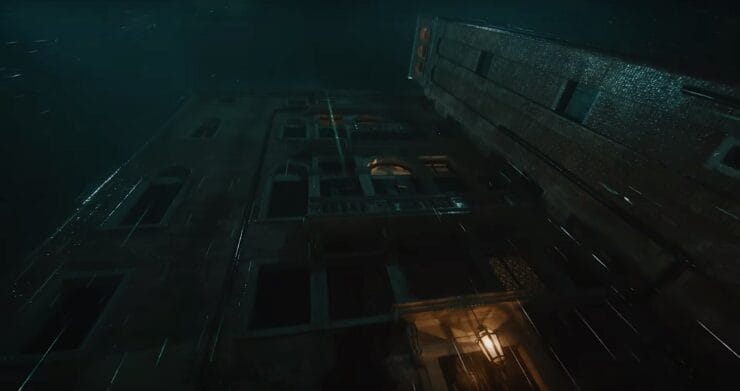
Now if you want to go in unspoiled, I’ll sum up: The mystery is pretty satisfying, but the real reason to turn up for the movie, apart from the cast, is the atmosphere. You want dutch angles? WELL BRANAGH’S GONNA GIVE YOU DUTCH ANGLES. You want shadowy corners and the rat? GUESS WHAT. Crumbling walls? YOU BETCHA. Mirrors that reveal things that might not actually be there? BOY HOWDY. And even more, the score by Hildur Guðnadóttir is fantastic. (Between this, Ludwig Göransson’s incredible work for Oppenheimer, and getting to finally see Tarsem Singh’s The Fall in a theater, I’ve been swimming in good scores lately.)
If you noticed that mention of plague: this is also very much a film touched by our ongoing pandemic. An outbreak of plague is what led to the the villa being haunted in the first place. Most people are wearing masks of one sort or another, and one person is even attacked over theirs. The lone doctor in the group fights PTSD as he tried to keep up with the victims. Once the murders start, everyone is locked inside the house, with no escape or respite from each other. And a constant refrain is the idea of getting back to life—framed here as people returning to normal after horrific wartime experiences, but obviously serving as a comment on all of us, now. These characters also realize that going back to normal isn’t going to be so simple.
So having said all of that, before I get into some slight spoilery stuff: if you liked the first two I think you’ll really like this one. It is definitely the strongest of the three, and the supernatural thriller gloss adds a whole other layer to it. It’s over-the-top, old-fashioned, and fun as heck.
Now I’m gonna dig into something that I would call a thematic spoiler—I’m not going to give any of the plot or central mystery away, but I’m going to talk about an interesting choice the Michael Green and Branagh make that will probably affect how you watch the movie. [So bail out now if you want to remain in the dark!]
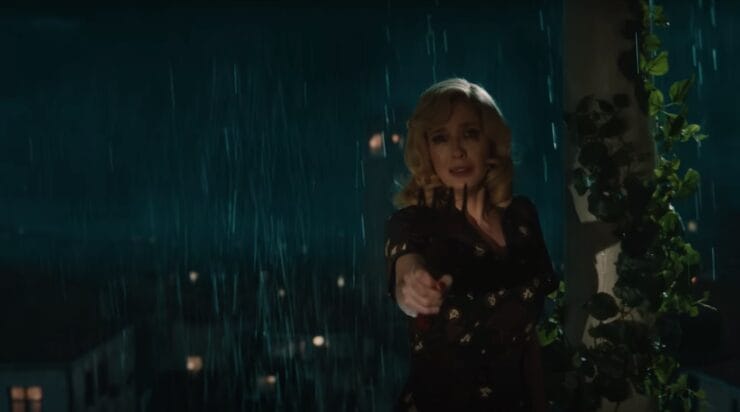
I can’t believe I’m saying this about yet another movie, but this one also ends up pitting what could loosely be termed “science” against what could loosely be termed “religion,” with mixed results. I did not expect this in the fun spooky Poirot movie! Obviously, I want to write about it, because it surprised me, but can I please get through a single work of film or tv this year without having to grapple with God?
In Murder on the Orient Express, Poirot invokes God as the only other being, besides himself, who will know which of the passengers is lying about murder. In Death on the Nile, he tries to get through to Jacqueline de Balfour, who has been stalking her ex-fiancé, Simon Doyle:
“You can ruin this life or start a new one. It might not be the life you imagined, but perhaps it will be the one that God intended.”
He muses on how “I became… whatever it is I am now” after the death of his own fiancée, Katherine, who was coming to visit him at the hospital during WWI when she was killed in a mortar attack. “I was going to be a farmer,” he continues. Given the context, that he was injured and put in the hospital immediately after using his deductive reasoning to save his company, that his captain told him he shouldn’t be a farmer because of it, and that Katherine died soon after, which made the life they’d been planning impossible, it’s an easy jump to see that this is Poirot thinking through his own life as he tries to give advice to Jackie. Rather than try to recreate the life he wanted, but without Katherine, he created a new one as a detective using the skills his captain had praised. Given that in the last film he said that he and God always found the truth, it would seem that he thinks this life as a detective is the “one that God intended”—and that his own basic happiness was a sacrifice he had to make to live that life, as being able to see the truth all the time makes him miserable.
But in A Haunting in Venice, it seems, any idea that he has a greater purpose has been lost. Part of the reason Poirot is summoned to this case in particular is that his friend Ariadne wants to get him to admit that there are mysteries in the universe even the great Hercule Poirot can’t explain. Thus, the fun spooky seance movie is kind of also being cast as an argument for/against faith—with Ariadne insisting that she believes the ghost is real, and that he’ll be believer, too, once he sits through a seance with Joyce Reynolds.
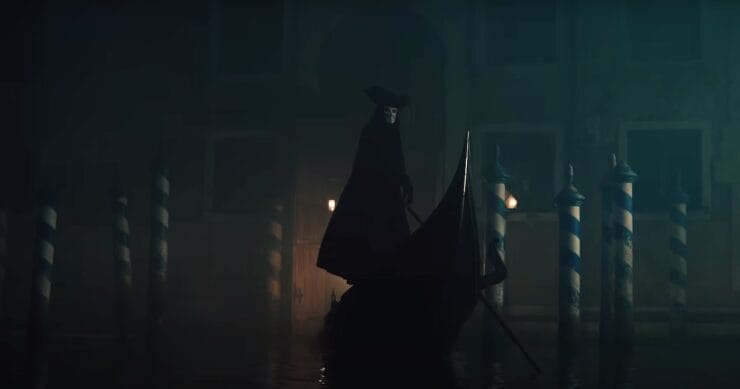
He jumps right to the point, when people ask if he believes in ghosts, by saying that he doesn’t believe in the continuation of consciousness after death. He spins that into saying that he also doesn’t believe in God, or any meaning to the universe—he thinks life is random chaos. Which also seems to be why he’s retired, because if the universe itself is chaos, what’s the point of solving cases or restoring order to society?
(I would say there’s even more of a point then, which, if you’ll permit me, turns Kenneth Branagh’s third Hercule Poirot adaptation into kind of a nuanced way to comment on a lot of philosophical thought after WWII—a lot of philosophers and theologians had to come up with radical new ways to think about morality after facing the stark realities of the Holocaust and the atomic bomb. Here Poirot, at least initially, is taking the path of simply embracing chaos, rather than making the choice to create order from it, as, say, Camus or Sartre would advise.)
I find it interesting because I’m always intrigued by the weird, unexpected choices writers and directors make. In this case, Branagh has added a throughline about Poirot’s relationship to the ideas of faith, fate, destiny, and materialism vs. spirituality. There’s a version of this movie where people ask Poirot if he believes in ghosts, and he says something like “One has never presented itself to me,” or “I find the living keep me too busy to go searching for spectres,” or “One never knows what mysteries the universe holds,” or whatever, that wouldn’t be a yes, but would also keep things light. Instead he jumps straight to: “The atrocities of the Second World War have robbed me of the faith in God that I had in the last one of these movies, there is no mystery on earth that man’s mind cannot solve, and I will spend this movie proving that.”
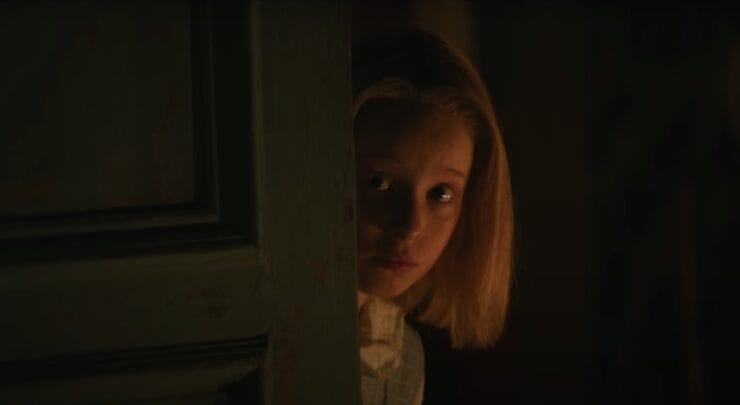
Now here’s the thing, though (and it’s possible that I fixate on this because of my own novel project): As soon as you decide to take ghosts really seriously you change the tone of your fun haunted house story. Because then, you have to then make a bunch of decisions about where you want the movie to land.
- Do you want to go materialist, and bring the hammer down on disproving all the supernatural elements?
- Do you want to go religious, and work through what the existence of ghosts means to your story’s cosmology?
- Are ghosts some sort of psychic pattern, repeating actions from life with nothing we’d define as sentience?
- Are they trapped souls that are conscious of being trapped, and if so, what do you mean by “trapped”?
- Is there an SOP to death in your world, and are the ghosts violating it, intentionally or no?
- Why can’t they leave?
- Who or what is keeping them in the house or villa or whatever?
- Are they being punished? If so: for what, by whom, and why?
- What do they remember, if anything, of their physical life?
- What do they want?
- How are your mortal characters going to relate to them?
- Are you going to come down on “ghosts are real, here’s objective proof of the continuation of consciousness after death in the world of this movie?” And if so, how are you going to have your characters react to that revelation?
- Are you going to come down on “…maybe?” And if it’s maybe (maybe’s a perfectly acceptable answer, btw) is it a maybe in the world of the movie, or in the character’s mind?
Buy the Book
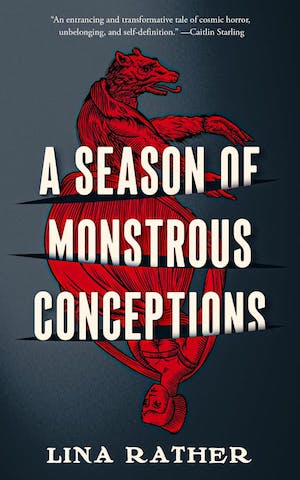

A Season of Monstrous Conceptions
You don’t have to get totally serious about these questions, but I do think you have to consider them as you create your world. You can have something like Thir13en Ghosts, that nods towards the realities of death, grief, and mourning, and how the existence of ghosts would affect that, but then also be silly in your execution. You can go the route of The Haunting and balance on a knife’s edge between, they’re real, and attacking people, and the main human character is so traumatized and unstable that she’s creating them in her mind, and that main character might be objectively psychic in the world of the story but not realize it. (But I mean, Haunting of Hill House and The Haunting are damn high bars to clear.) You can go Beetlejuice and create a byzantine afterlife bureaucracy, but create such a deadpan tone that it stays fun, or go the route of The Others and create an afterlife bureaucracy that traumatizes the audience almost as much as the characters. You can give us a portal of light that appears to take dead souls to an afterlife and use that for a romantic murder mystery (Ghost) or a comedic murder mystery (The Frighteners).
But an interesting thing in all these examples is that, apart from The Others, I don’t think a single one of them drags God into it—and in the case of The Others, it’s a particularly religious character who does, not the move itself. Some of them have “Hell” realms and “Heaven” realms, and some frame their ghosts’ existence as purgatorial, but I’m racking my brain and not coming up with the God namedrop. (Tell me if you think of some!) So I think this is what startled me in A Haunting in Venice.
And this is where I’m not sure if the movie succeeds. It creates a surprisingly rich well of emotion for what could have been a fluffy mystery, but the movie also seems to want to have it all ways. Maybe the ghosts are hallucinations! Maybe they’re the souls of vengeful children! Maybe Poirot believes in them by the end, and maybe that means his faith in an orderly universe is restored! But it’s vague! And we never know for sure what the other characters believe about all this, except for young master Leopold, who says from the start that the ghost children are his friends. And while I liked what the film did, I think if it was going to bring these bigger questions up, it could have dwelled on them more and ratcheted up Poirot’s existential angst, and his growing confusion about the possible ghosts. Basically, I wanted a little more horror in this gothic mystery. But it was still a fascinating take on what could have been a by-the-numbers mystery, and once again I find myself hoping for more of these movies.










